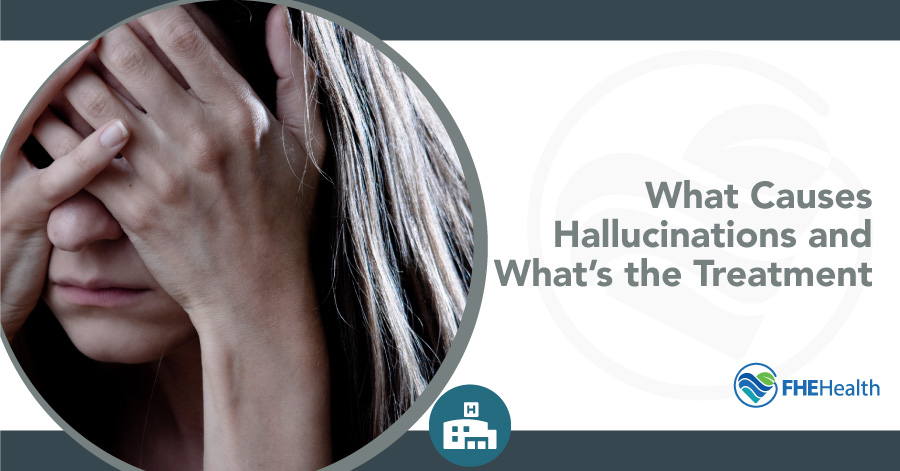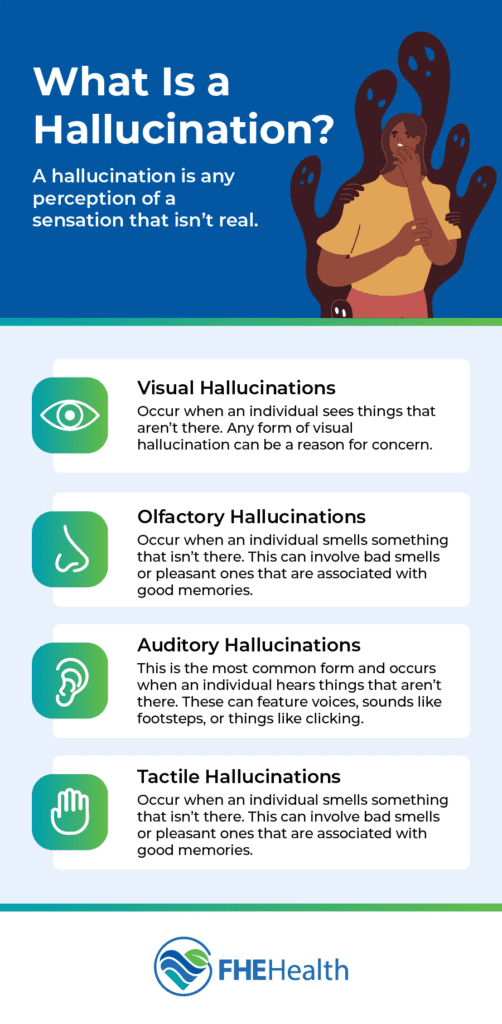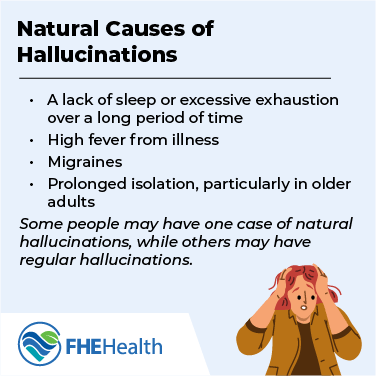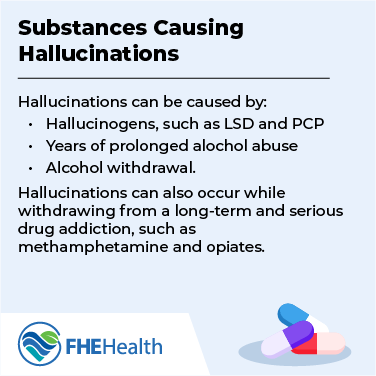
A Beautiful Mind. Take Shelter. Ironweed. Hallucinations are frequently presented in the media as a convenient plot device, but the reality of hallucinations is often quite different. As such, hallucinations are largely misunderstood by the general public, including people who have experienced them.
For those who have hallucinations, either as a result of medical issues, mental illness, or drug use, the experience can be distressing. When sounds, sights, or smells that can’t be explained occur, many people find themselves frightened or ashamed.
Around one in 20 people have experienced hallucinations unrelated to drugs or other substances. Five percent have had more than one hallucination. In spite of this, there remain holes in science’s understanding of hallucinations, including a full picture of what causes them and how to properly treat them when the cause is unclear.

What Is a Hallucination?
A hallucination is any perception of a sensation that isn’t real. However, in the moment, hallucinations feel as real as any other experience, which can be very alarming. This is especially true for those who have never experienced hallucinations before or who have no diagnosis that could result in hallucinations.
The terms “hallucination” and “delusion” are sometimes used interchangeably, but they are actually two different concepts. A delusion is a false belief while a hallucination is a false perception of reality.
Hallucinations come in a few different forms. Some individuals prone to hallucinations experience multiple types while others have only one.
Visual Hallucinations
Visual hallucinations occur when an individual sees things that aren’t there. These can be major, like seeing people who aren’t present, or less so, like flashing lights. Any form of visual hallucination, including those that aren’t disturbing or unpleasant, can be a reason for concern.
Olfactory Hallucinations
Olfactory hallucinations are those in which an individual smells something that isn’t there. This can involve bad smells, like things burning or intense body odor that can’t be washed away. Olfactory hallucinations can be pleasant as well, involving scents an individual finds pleasing or associates with good memories.
Auditory Hallucinations
Auditory hallucinations, or hearing something that isn’t there, are among the most common forms of hallucinations. These can feature voices, sounds like footsteps, or things like clicking. Many people who have auditory hallucinations hear people yelling at them or telling them to do things they may not want to do. These hallucinations are often referred to as “hearing voices.” In reality, those affected aren’t truly hearing anything at all; it’s all in their minds.
Tactile Hallucinations
When having tactile hallucinations, individuals believe they feel things that aren’t actually there. Common tactile hallucinations include bugs crawling on the skin, organs moving within the body, or touching from invisible hands. Tactile hallucinations are generally unpleasant sensations.
Natural Causes of Hallucinations
 While hallucinations can be caused by drug abuse or both mental and physical illness, there are many natural reasons for hallucinations. These aren’t related to medical issues but rather circumstances that could occur in most people.
While hallucinations can be caused by drug abuse or both mental and physical illness, there are many natural reasons for hallucinations. These aren’t related to medical issues but rather circumstances that could occur in most people.
These include:
- A lack of sleep or excessive exhaustion over a long period of time
- High fever from illness
- Migraines
- Prolonged isolation, particularly in older adults
Some people may have one case of natural hallucinations, while others may have regular hallucinations.
Medical Cause of Hallucinations
Medical conditions are the most common cause of hallucinations. Many different mental or physical health issues can play a role in hearing, seeing, smelling, or feeling things that aren’t there.
Schizophrenia is a very common cause of hallucinations of all kinds, though auditory are most common. Other mental illnesses, like bipolar disorder, borderline personality disorder, and PTSD can also have the same result.
Dementia and Parkinson’s Disease can also cause hallucinations. Individuals with epilepsy may experience hallucinations as a part of seizures or an aura before a tonic-clonic seizure. Strange smells are often signs of an aura.
Some medications. Other causes include brain tumors, deafness, blindness, vision problems, and kidney or liver failures.
Substances Causing Hallucinations
 Those who don’t have hallucinations for medical or natural causes often have hallucinations related to drug or alcohol use.
Those who don’t have hallucinations for medical or natural causes often have hallucinations related to drug or alcohol use.
As the name implies, hallucinogens often cause hallucinations. Drugs like LSD, PCP, and salvia are often taken because of the distortion of reality that comes with use. In these cases, hallucinations are part of the goal of getting high. While these hallucinations can be unpleasant—this is often referred to as a “bad trip“—they generally aren’t a cause for concern.
Alcohol abuse has this ability as well, but only after months or years of chronic use. This is caused by the effects of abuse on the brain and a decrease of thiamine in the body. Hallucinations can also be caused by alcohol withdrawal. Alcohol withdrawal can cause a condition called “delirium tremens.” Symptoms include seizures, hallucinations, agitation, and delirium. When severe enough, delirium tremens can be fatal. For this reason, detoxing from alcohol is best done under medical supervision.
Psychosis, including hallucinations, can also occur while withdrawing from a long-term and serious drug addiction, such as methamphetamine and opiates. These side effects can last for hours or days and generally require medical attention. For methamphetamine users, hallucinations can even occur months or years after ceasing use.
Treatment for Hallucinations
If hallucinations are a concern, the first step to getting effective treatment is to consult a doctor—ideally a psychiatrist. They will want to investigate whether hallucinations are in fact occurring and if so, what might be the explanation. They may also perform medical tests such as a brain scan or labwork.
For those whose hallucinations are associated with a mental illness, a combination of medication and therapy may be prescribed. Medications that calm the nervous system can be very effective, especially for conditions like dementia or Parkinson’s. For those with schizophrenia, medication is often the only solution, though finding a proper regimen can take time and energy.
When to Seek Help
Some people who live with hallucinations may think there’s no treatment or cure—this isn’t true. Many forms of hallucinations can be addressed once a cause is identified, even if it takes time to find a diagnosis and a proper treatment plan.
In some cases, severe hallucinations can cause paranoia or fear. Those affected may be willing to go to extreme measures to make the hallucinations go away. This can become an emergency situation that calls for immediate care. In other cases, individuals may begin to think their hallucinations are real. This can result in a break from reality and is a serious problem that can only be treated with intensive medical intervention.
If you or someone you love is experiencing hallucinations as a result of substance abuse or mental illness, help is available. Contact FHE Health today to learn more about treatment for both substance use disorders and mental health disorders that may cause hallucinations.






